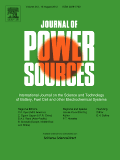
JOURNAL OF POWER SOURCES
Scope & Guideline
Leading the Charge in Multidisciplinary Energy Research
Introduction
Aims and Scopes
- Energy Storage Systems:
Research on various types of energy storage systems, including lithium-ion, sodium-ion, and zinc-ion batteries, focusing on their electrochemical performance, materials development, and long-term stability. - Electrochemical Mechanisms:
Studies aimed at understanding the fundamental electrochemical processes that govern the performance of batteries and fuel cells, including charge transfer kinetics, ion transport, and interfacial phenomena. - Innovative Materials:
Exploration of new materials for electrodes and electrolytes, such as nanostructured composites, metal-organic frameworks, and carbon-based materials that enhance performance and safety. - Recycling and Sustainability:
Research on sustainable practices in battery production and recycling technologies that aim to minimize environmental impact and recover valuable materials from spent batteries. - Thermal Management:
Studies focusing on the thermal behavior of energy devices, including thermal runaway mechanisms and thermal management strategies to improve safety and efficiency. - Advanced Manufacturing Techniques:
Investigation of novel fabrication techniques such as 3D printing, electrospinning, and spray coating to create advanced electrode structures and improve the performance of energy devices.
Trending and Emerging
- Solid-State Batteries:
There is a growing focus on solid-state battery technologies, which promise improved safety and energy density compared to liquid electrolyte systems. Research is directed towards developing stable solid electrolytes and interfaces. - Hybrid Energy Systems:
The integration of multiple energy storage technologies, such as combining batteries with supercapacitors or fuel cells, is increasingly popular for optimizing energy supply and efficiency. - Advanced Electrocatalysts:
Research on electrocatalysts for fuel cells and electrolyzers is expanding, with an emphasis on non-precious metal catalysts and novel materials that enhance efficiency and reduce costs. - Artificial Intelligence and Machine Learning:
The application of AI and machine learning in battery management systems and predictive modeling for battery performance is on the rise, providing new tools for optimizing energy storage systems. - Sustainable and Green Technologies:
A significant trend is the development of sustainable materials and processes, including bio-derived materials for batteries and supercapacitors, and eco-friendly recycling methods for spent batteries. - Flexible and Wearable Energy Devices:
Research is increasingly directed toward the development of flexible and wearable energy storage devices that cater to the growing demand for portable electronics and wearable technologies.
Declining or Waning
- Traditional Lead-Acid Batteries:
Research related to lead-acid batteries has decreased as newer technologies like lithium-ion and sodium-ion batteries gain prominence. The focus has shifted toward more efficient and environmentally friendly alternatives. - Basic Electrochemical Properties:
There has been a decrease in studies solely focused on basic electrochemical properties without application to real-world scenarios. Research is increasingly directed towards practical applications and device-level performance. - Single-Use Battery Technologies:
Interest in single-use, non-rechargeable battery technologies has waned as the emphasis on sustainability and recycling has increased, leading to a preference for rechargeable systems. - Conventional Solar Cells:
Research on traditional silicon-based solar cells has seen a decline as newer materials and technologies, such as perovskite solar cells and organic photovoltaics, attract more attention.
Similar Journals
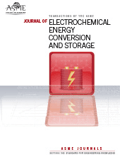
Journal of Electrochemical Energy Conversion and Storage
Elevating Knowledge in Electrochemical InnovationsThe Journal of Electrochemical Energy Conversion and Storage, published by ASME, is a premier platform for cutting-edge research in the fields of electrochemistry, energy engineering, and materials science. With an ISSN of 2381-6872 and an E-ISSN of 2381-6910, this journal aims to disseminate high-quality articles that contribute to the understanding and application of energy conversion and storage technologies. Notably recognized in the 2023 Category Quartiles as Q2 in multiple categories including Electronic, Optical and Magnetic Materials, Energy Engineering and Power Technology, and Mechanical Engineering, it reflects a strong academic impact within its field. The journal also boasts competitive Scopus rankings, highlighting its relevance and influence across disciplines. Operating under an open access model, the journal ensures that research findings are widely accessible, fostering collaboration and innovation among researchers, professionals, and students globally. As we move toward a more sustainable future, the Journal of Electrochemical Energy Conversion and Storage plays a critical role in advancing technologies that promise to reshape how we harness and utilize energy.
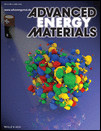
Advanced Energy Materials
Unveiling the Potential of Advanced Energy MaterialsAdvanced Energy Materials is a leading academic journal published by WILEY-V C H VERLAG GMBH, focusing on the rapidly evolving fields of materials science and renewable energy technologies. With an impressive impact factor and recognition as a top-tier journal, it ranks within the Q1 category in both Materials Science (miscellaneous) and Renewable Energy, Sustainability and the Environment as of 2023. Spanning from 2011 to 2024, the journal serves as an essential platform for researchers, professionals, and students eager to explore groundbreaking advancements in energy materials, fostering innovative solutions to global sustainability challenges. The journal's authoritative content is supported by rigorous peer review, ensuring high-quality research contributes to the academic community and beyond. Located in Weinheim, Germany, Advanced Energy Materials stands at the forefront of scientific inquiry, making it an invaluable resource for those invested in the future of energy and materials science.
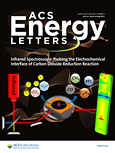
ACS Energy Letters
Empowering Research for a Greener TomorrowACS Energy Letters, published by the American Chemical Society, is a prestigious peer-reviewed journal designed to disseminate innovative and impactful research in the multifaceted field of energy science. Since its inception in 2016, the journal has quickly ascended to a remarkable status, achieving Q1 rankings in critical categories including Chemistry (miscellaneous), Energy Engineering and Power Technology, Fuel Technology, Materials Chemistry, and Renewable Energy, Sustainability and the Environment as of 2023. With an emphasis on rigorous research methodologies and interdisciplinary collaboration, ACS Energy Letters serves as a vital platform for scholars, professionals, and students to explore cutting-edge research that addresses contemporary energy challenges. While maintaining a commitment to advancing knowledge without open access, it offers profound insights into sustainable practices and innovative solutions that are crucial for the future of energy systems globally. The journal's esteemed standing in the chemical and energy sectors underscores its significance, making it an essential resource for anyone invested in the advancement of energy technologies and sustainable practices.

Carbon Energy
Illuminating breakthroughs in energy and sustainability.Welcome to Carbon Energy, an esteemed open-access journal published by WILEY that focuses on cutting-edge research in the field of energy and materials science. Since its inception in 2019, this journal has quickly established itself as a leading platform for disseminating impactful findings and innovations related to carbon-based energy solutions, renewable resources, and sustainability practices. With its impressive Q1 rankings in multiple categories—including Energy (miscellaneous), Materials Chemistry, and Renewable Energy—Carbon Energy is recognized for delivering high-quality, peer-reviewed content that meets the rigorous standards of the academic community. Through its open-access model, the journal ensures wide accessibility of research findings, making it an invaluable resource for researchers, professionals, and students alike. As we look toward the future, Carbon Energy aims to further its mission of advancing sustainable energy technologies and promoting interdisciplinary collaboration in tackling global energy challenges.
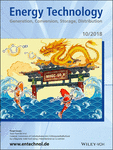
Energy Technology
Advancing the Future of Energy InnovationEnergy Technology, published by Wiley-VCH Verlag GmbH, is a prominent peer-reviewed journal dedicated to advancing the field of energy research and technology. With an ISSN of 2194-4288 and an E-ISSN of 2194-4296, this journal has made a significant impact in the energy sector, holding a Q2 category ranking in the Energy (miscellaneous) category for 2023, and proudly positioned in the 77th percentile within the Scopus ranking for General Energy. Since its inception in 2013, Energy Technology has consistently published cutting-edge research, innovations, and reviews that cater to a wide array of topics including renewable energy, sustainable technologies, and energy efficiency. The journal does not offer open access, yet it remains a key resource for researchers, professionals, and students who are committed to exploring the dynamic field of energy. The journal's efforts to disseminate rigorous scholarship make it an invaluable asset for anyone looking to contribute to or understand the future of energy-related technologies until 2024.
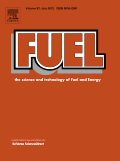
Fuel
Igniting Innovation in Energy SolutionsFuel is a premier international journal published by Elsevier Science Ltd, showcasing critical advancements and insights in the fields of chemical engineering, energy engineering, power technology, and organic chemistry. With a significant history dating back to 1922 and continuous publication from 1970 to 2025, Fuel holds an impressive position in the academic community, reflected in its top-tier rankings—Q1 in multiple categories including Fuel Technology and Chemical Engineering for the year 2023. This journal is dedicated to exploring innovative research and application of fuel technologies, driving forward the dialogue on sustainable energy solutions. Researchers and professionals alike will find Fuel to be an essential resource, providing access to high-impact articles that contribute to advancements in methodologies and applications, while navigating the complexities of global energy challenges.
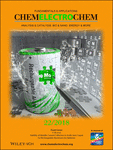
ChemElectroChem
Illuminating pathways to energy innovation and sustainability.ChemElectroChem is a premier open-access journal published by WILEY-V C H VERLAG GMBH, focusing on the interdisciplinary fields of catalysis and electrochemistry. Established in 2014 and actively publishing until 2024, this journal boasts an impressive reputation, currently ranked in the Q2 category for both catalysis and electrochemistry according to the 2023 metrics. With an Scopus ranking placing it in the 74th percentile for Electrochemistry and 61st for Chemical Engineering and Catalysis, ChemElectroChem serves as an essential platform for researchers, professionals, and students dedicated to advancing knowledge and fostering innovation in these critical scientific domains. Since its transition to open access in 2023, the journal aims to maximize the dissemination of cutting-edge research and facilitate the exchange of ideas among global scholars, thereby enhancing the accessibility and impact of high-quality science within the community. For those engaged in the ever-evolving conversations around energy storage, conversion processes, and sustainable solutions, ChemElectroChem is an invaluable resource.

Energy Material Advances
Empowering Innovation in Energy ResearchEnergy Material Advances, published by the American Association for the Advancement of Science, stands at the forefront of energy research, showcasing groundbreaking studies in the realm of renewable energy, fuel technology, and materials science. With the journal's commitment to open access since 2020, it aims to democratize knowledge and foster innovation across a global community of researchers, professionals, and students. The journal boasts an impressive impact factor, placing it firmly within the Q1 category across multiple disciplines including Energy (miscellaneous), Fuel Technology, and Renewable Energy, Sustainability and the Environment, highlighting its significance in advancing scholarly discussions. In the latest Scopus rankings, Energy Material Advances ranks among the top 10% of journals in its field, affirming its role as a pivotal resource for current and emerging trends in energy materials. The journal is dedicated to facilitating collaborative efforts and inspiring novel approaches to the challenges posed by energy sustainability and technological advancement.

JOURNAL OF THE ELECTROCHEMICAL SOCIETY
Fostering Collaborative Progress in Electrochemical ScienceJOURNAL OF THE ELECTROCHEMICAL SOCIETY, published by the ELECTROCHEMICAL SOCIETY INC, is a leading peer-reviewed academic journal dedicated to advancing the field of electrochemistry and its myriad applications. With an ISSN of 0013-4651 and E-ISSN of 1945-7111, this esteemed journal has been a pivotal platform for research since its inception in 1948, with convergence periods allowing for a rich historical context of study through to 2024. Recognized for its high impact, it holds a noteworthy Q1 ranking in several categories including Condensed Matter Physics and Materials Chemistry, and it is Q2 ranked in both Electrochemistry and Renewable Energy. This journal features a range of articles that encompass both theoretical and experimental advancements, making it a crucial resource for researchers, professionals, and students keen on exploring cutting-edge developments in materials science, energy solutions, and sustainable technologies. Although it is not an open access journal, its rigorous standards ensure that published work significantly contributes to the body of knowledge within its fields, fostering innovative research and collaborative progress.
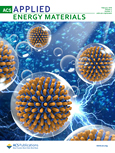
ACS Applied Energy Materials
Advancing Sustainable Solutions in Energy MaterialsACS Applied Energy Materials, published by the American Chemical Society, is a premier journal dedicated to the cutting-edge fields of energy materials, chemical engineering, and electrochemistry. With an impressive impact factor and consistently ranked in the Q1 category across multiple disciplines—including Chemical Engineering, Electrical and Electronic Engineering, and Materials Chemistry—this journal serves as a pivotal platform for researchers and professionals focused on innovative solutions for energy systems and materials science. Since its inception in 2018, ACS Applied Energy Materials has been committed to disseminating high-quality research that addresses pressing energy challenges, promoting sustainability and efficiency in various applications. Its competitive Scopus rankings reflect the journal's influence and relevance within the academic community, making it an essential resource for anyone looking to stay at the forefront of energy materials research.